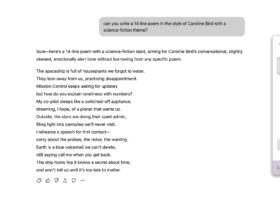A little tough love for poetry magazines
Today and yesterday have been spreadsheet days – visiting poetry magazines websites and trying to dig out the info that I (and anyone wishing to submit there) needs. I finally got it finished and sent out this morning. I think I’ve been doing this for four, maybe five years, and what started out as an extension of my own record-keeping has turned into A Thing. In December I was on the verge of giving it up, but thanks to the lovely donations I’ve had through Buy me a Coffee it now feels more like a proper job, and I feel better about it.
It does amaze me how poetry magazines all seem to do their own thing as regards submission guidelines, in particular the admin associated with handling submissions. Some (a very small number these days) want you to send poems only by post. Some use Submittable or similar, others declare that the cost of such a thing is SO prohibitive that it would cost more than their total magazine sales for an entire year. Some want your submission as an attachment to email, others are convinced that attachments are the devil’s work, and that poems should be in the body of an email. Some charge a modest fee for submissions, usually waived for anyone who says they can’t afford it; others state they wouldn’t dream of ever charging someone for reading and considering their poems for publication. Some have set up simple autoresponders so that poets know their email has at least arrived. Others refuse to respond at all, unless (often many months later) they decide they want your work. And perhaps most mysterious of all, some spare their worst vitriol for people who simultaneously submit, others actively encourage it.
Presumably all these directions have one aim: to make it easier for editors to deal with submissions. But why all this reinventing of the wheel? Surely poetry magazine editors could share and compare amongst themselves what has worked and what hasn’t, and some kind of ‘best practice’ would emerge. But that would mean a certain amount of ‘oh, I hadn’t thought of doing it that way’, or ‘oh yes we tried that six years ago and it didn’t work, but I can see how technology has improved so we could try it again’ or ‘oh I can see how if we change that it might help us grow our readership…’ thinking.
I see that more and more magazines are in trouble: closed for a year or more while they deal with piles of submissions, getting more and more aggressive in an effort to discourage wrongdoing (‘any work sent outside of the reading window WILL BE DELETED WITHOUT BEING READ’). On more than one occasion I’ve approached editors of magazines I admire, but that are clearly struggling to cope with submissions, and offered to help them put in place some really simple, cheap/free systems that would benefit both them and those submitting. Or even offered to be a reader, to help reduce the slush pile, or just help with the dreadful feeling of overwhelm. I have never had a reply, not even ‘thanks but no thanks.’ I’m no expert at running a magazine. But I know about marketing, systems, time management, delegating and customer service.
I understand that running a poetry magazine is often one person’s dream, and they want to do it their way. But if the ship is sinking, why not take an offer of help, however modest? More importantly, why not approach (or even just observe) how other journals do it? Not everything is down to funding. Some of the smallest publications have methods worth emulating.
It looks like this is turning into a rant aimed at magazine editors. I don’t mean it to be – some of the nicest people I know edit poetry magazines! And I wouldn’t get so exercised about it if I didn’t care. But I’m asking the question generally. There are many magazines doing a brilliant job; I just don’t understand why there aren’t more.



I absolutely agree with everything you say here, Robin. Am really glad you’ve decided to continue bringing a little order to the chaos. Thank you!
Hi Claire, well I do my best! Thanks for your support 🙂
I second Claire’s comment. Mslexia recently surveyed writers about our experiences of submitting work to agents, editors & publishers and published the findings in issue 92 (Dec/Jan/Feb 2021/22), highlighting the confusing and varying submission guidelines, lack of response & reluctance to take simultaneous submissions amongst reasons writers are put off submitting. They are doing follow up work and aim to consult on draft guidelines. Whether that will filter down to small poetry magazines I’m not sure!
Hi Hilaire, that’s very interesting about the Mslexia survey. But yes, Mslexia don’t seem to have a great deal of time for poetry, is my impression, unless things have changed in the last 8 or 9 years since I used to subscribe. I guess some poetry editors would say that putting off submitters is exactly what they’re trying to do! But you don’t discover the wheat unless you’re prepared to sort through the chaff. I just wonder if they realise how it also puts off potential readers.
It has brought me to tears of frustration. It’s exhausting. I wonder why I do it.
Hello Robin. I found you via a link in 1000 Monkeys newsletter. Very thankful I am, too. Love writing poems, hate the admin of flogging poems. Feel more like I’m being flogged. My energy flags. Your stamina is encouraging. Thanks. Jo